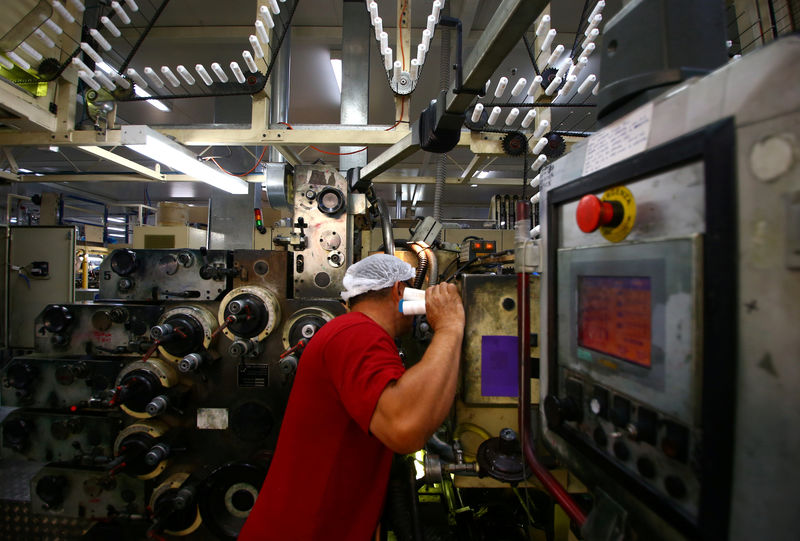By Charlotte Greenfield and Aaron Bunch
WELLINGTON/SYDNEY (Reuters) - As China's middle class develops its taste for imported food and drink, fresh produce suppliers in New Zealand and Australia are topping up nature's bounty with anti-counterfeiting technology in a bid to protect their growing business from fakes.
Suppliers of goods from fruit to wine and lamb are teaming up with makers of tracking systems, codes and powders to combat fakes that cost the global food business billions of dollars. As tech tools become cheaper, services like China's popular WeChat smartphone app are also being deployed, offering consumers a free scanning ally to work out what's on Chinese store shelves.
Smaller players like meat company Silver Fern Farms and Synlait Milk (NZ:SML) have tapped local tech firms like Dunedin's Oritain, which measures food isotopes as a checkable 'fingerprint'. But Chinese e-commerce giant Alibaba (N:BABA) is also in on the act with a pilot Blockchain-based tracing system, signing up Kiwi dairy giant Fonterra (NZ:FCG) (NZ:FSF) and Australian vitamin supplier Blackmores (AX:BKL) as partners.
"We see the Australian and New Zealand markets setting the tone for the rest of the world when it comes to integrity, safety and quality of food supply chains," said Maggie Zhou, Alibaba's Australia and New Zealand managing director, in comments published to mark its project launch at a late March Canberra ceremony. "It was a natural decision to pilot a programme here."
Dislodging counterfeit food, now a well established business of its own, presents no small challenge. Fraud costs the global food industry an estimated $40 billion a year, Alibaba said, citing research conducted by Michigan State University.
In China, $1 billion in counterfeited goods was seized in 2014, according to the International Anti-Counterfeiting Coalition.
"Categories that are faked so regularly are the (fresh produce) ones where New Zealand and Australia are strong," said Mark Tanner, director of Shanghai-based China Skinny, a firm that advises Western businesses operating in China.
But firms in Australia and New Zealand are prepared to go to increasing lengths to protect sales they rely on for growth.
New Zealand's total exports to China have quadrupled to NZ$12 billion ($8.62 billion) since 2007, most of them being food and beverage products. Australia agriculture exports to China were worth around A$10 billion ($7.67 billion) in 2016, double the amount five years earlier.
QUICK RESPONSE
Widespread use of apps like WeChat, owned by Chinese internet giant Tencent Holdings (HK:0700), and developments in technology like machine learning have made it easier and cheaper for smaller tech firms to develop anti-counterfeiting technologies.
That lower cost base has brought what tracking systems that were previously solely in the realm of multinational giants like HP (N:HPE) and Walmart (NZ:WMT) within reach of the small to mid-level firms that are the backbone of the food and drink business in New Zealand and Australia.
Oritain charges customers NZ$300-700 per isotope test product, while for from around NZ$200 a month, Auckland-based Trust Codes supplies a machine-learning algorithm that can pull data from consumers' phones in China when they scan a product's encrypted Quick Response, or QR, packaging code.
At Auckland manuka honey firm Oceania Natural (NZ:ONL), Chief Executive Walker Zhong said he used his knowledge of Chinese consumers' shopping, social media habits and liking of convenience in building Oceania's own scanning system at a cost of NZ$1 million.
Backed by a Chinese insurer, Oceania Natural's tool revolves around WeChat - which Zhong knew Chinese consumers would already have on their smartphones - sending an alert if the scannable code on product has been used before, indicating in one step whether it's genuine.
"China consumers...they don't like to use two steps or three steps to verify your product is genuine," said Zhong.
Pitfalls remain. Packaging can be tampered with, or even faked, and that many exports like meat are still sent to China in bulk shipments without any packaging for consumers at all.
"The only real way of knowing is testing the actual product," said Sam Lind, operations director at Oritain. "We're at the whim of counterfeit packaging just like anyone else."
